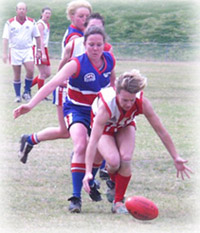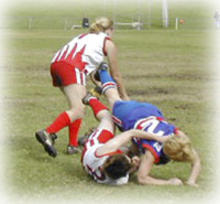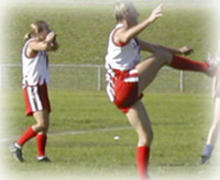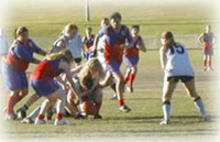You are here
Tips

Use of Body
Its generally good practice to position your body between the ball and any opposing player (see left) to gain the advantage when going for the ball. Stay balanced to avoid being bumped or knocked over.
Staying on Your Feet
As a last ditch effort, it may be necessary to go all out and tackle an opponent to the ground, taking yourself with it – or you might be going for a ball on the ground and lose your balance. Try avoid losing your footing as several things may occur: 1) it requires more energy to recover from being flat on the ground 2) you might risk injuring yourself and 3) the minute you are on the ground – your team is one player down.
Talking
Communication on the field is paramount. Especially because the opposition can attack you from 360°, its important that your team mates alert you of your situation. One of the most dangerous situations is when a player thinks they have time to consider their next move, and a defender is only seconds away from tackling them to the ground because no-one has informed them. Talking is also important for encouragement.
Crumbing
Crumbing is where a player will deliberately stand a few feet away from play, waiting for the ball to tumble out from a group of players contesting it (see no. 15). They are usually also in a good clear position to receive the ball from one of their team mates who may be in the group who will then bat or pass the ball to them.
Free Kick
If your opponent is awarded a free kick, you need to hand the ball to them precisely. If you throw the ball in anyway not directly at them, they could be awarded a 50 metre penalty which means they advance 50 metres towards their goal. Also, free kicks usually go to the player who has had the infringement against them ie if someone is tackled high – it is that player who has to take the free kick.



